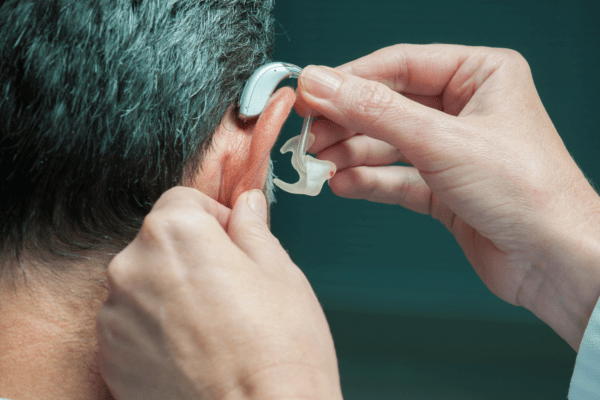Hearing loss is the third most prevalent chronic condition affecting the elderly, after high blood pressure and arthritis. Disabling hearing loss can have an impact on the development of many diseases and vice versa. Research has shown that once developed, hearing loss affects the quality of life, emotional health, and even raises the risk for dementia.
Hearing loss occurs gradually as you age. While the symptoms may not be apparent for years in some people, others lose auditory function much more abruptly because of immediate or prolonged exposure to loud ear-damaging noises, damaging to inner ear structures. The Occupational Safety and Health Administration (OSHA) notes that noise-induced hearing loss is a common illness that is frequently ignored because it occurs gradually and usually without accompanying pain.
Aging is one of the factors that contribute to hearing loss. However, not all hearing loss is age-related. Other factors, such as infections, excessive earwax, head trauma, and abnormal bone growths can also cause hearing loss.
The effects of hearing loss are more than an auditory problem. Left undiagnosed or untreated, it can interfere with daily communication and affect other areas of your overall health.
Signs and Symptoms of Hearing Loss
According to Mayo Clinic, signs and symptoms of hearing loss may include:
- Muffling of speech and other sounds
- Difficulty understanding words, especially against background noise or in a crowd
- Trouble hearing consonants
- Frequently asking others to speak more slowly, clearly and loudly
- Needing to turn up the volume of the television or radio
- Withdrawal from conversations
- Avoidance of some social settings
Types of Hearing Loss
Hearing loss can be classified into three types:
- Conductive. This type of hearing loss is caused by obstructions or malfunctions in the outer or middle ear. It can be caused by outer or middle ear infections and malfunctions or a damaged eardrum.
- Sensorineural. This hearing loss is caused by damage to the hair cells in the inner ear. It can be caused by aging, exposure to loud noise, such as machinery or loud music, diseases such as meningitis, or medications.
- Mixed. This type can include a combination of the two.
Cognitive Impact of Hearing Loss
A study done found a greater decline in memory and other mental abilities in those who had a moderate-to-severe hearing impairment. If the hearing disability becomes severe enough, this sensory deprivation can be mentally debilitating.
Studies have found that straining to listen to a conversation for a prolonged period can cause damage to the neural pathways of the brain. For this reason, those with hearing loss are at a much higher risk of early-onset Alzheimer’s disease or dementia. According to various studies, the risk of dementia in those with even just a mild hearing loss is more than twice as high as it is for someone with normal hearing. Hearing loss has also been linked to accelerated brain tissue loss and general decline in cognitive function.
Physical Impact of Hearing Loss
Disabling hearing loss also manifests in physical ways. Labyrinthitis and vestibular neuritis are inner ear infections that can cause disorientation and nausea. Furthermore, ménière’s disease, that affects the ear’s fluid-filled labyrinth, can result in hearing loss and tinnitus in addition to dizziness. The brain registers changes in fluid, establishing your body’s sense of balance and equilibrium, these disorders can affect balance and spatial recognition, the risk of falling increases three times higher.
Other physical consequences of hearing loss include headaches, fatigue, and tension.
Emotional Impact of Hearing Loss
Undiagnosed or untreated hearing loss links to a number of psychological disorders. These struggles have been linked to social isolation and shame, which can lead to stress, depression, and anxiety in people with hearing loss. For the elderly, the constant effort to hear can lead to mental exhaustion, which studies indicate aggravate symptoms of dementia and other cognitive disorders.
Vision loss is also common comorbidity of hearing loss. Left untreated, this dual impairment could significantly reduce your quality of life, ability to communicate, and erode relationships.
Wearing hearing aids have shown to significantly improve people’s ability in almost all areas of life, from self-worth to relationships with friends and family.
How Good is Your Hearing?
The Hearing Health Foundation offers a self-assessment questionnaire to help you determine whether you should seek a full-scale hearing evaluation. If you answer yes to three of the following 10 questions, it is advised you make an appointment with your doctor for testing:
- Do you have a problem hearing over the telephone?
- Do you have difficulty following a conversation when two or more people are speaking?
- Do people complain that you turn the TV volume up too high?
- Do you have to strain to understand conversation?
- Do you have trouble hearing in a noisy background?
- Do you find yourself asking people to repeat themselves?
- Do many people you talk to seem to mumble?
- Do you misunderstand what others are saying and respond inappropriately?
- Do you have trouble understanding the speech of women and children?
- Do people get annoyed because you misunderstand what they say?
If you think you could be showing signs of disabling hearing loss, seeking professional help may benefit you better identify the cause and get the appropriate treatment.


